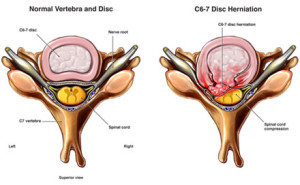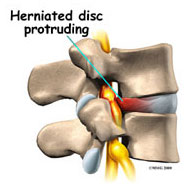Pain, Numbness & Weakness
Do You Have Shocking Pain, Numbness, or Weakness down your Arms or Legs?
You could be suffering from cervical or lumbar radiculitis.
Radiculitis
Individuals suffering from radiculitis report pain that radiates along a nerve path because of pressure on the nerve root where it connects to the spine. The location and type of pain depends on the area of the spine where the compression occurs. For instance, radiculitis in the cervical spine may cause pain in the neck or radiate down the arm. If located in the thoracic spine, radiculitis may cause pain in the chest area.
The most common complaint, however, is in the lower or lumbar area, with pain in the hips, legs, and feet. This type of pain is often called sciatica, since it most usually originates from the lumbar region, where the sciatic nerves enter the spinal canal. Sciatica is a common problem for those suffering from disc deterioration or injury involving the lower back.
Are You Suffering From Herniated Discs?
Many patients with back pain, leg pain, or weakness of the lower extremity muscles are diagnosed with a herniated disc. When a disc herniation occurs, the cushion that sits between the spinal vertebra is pushed outside its normal position. A herniated disc would not be a problem if it weren’t for the spinal nerves that are very close to the edge of these spinal discs.
What happens with a ‘herniated disc’?
As the spinal disc becomes less elastic, it can rupture. When the disc ruptures, a portion of the spinal disc pushes outside its normal boundary–this is called a herniated disc. When a herniated disc bulges out from between the vertebrae, the spinal nerves and spinal cord can become pinched. There is normally a little extra space around the spinal cord and spinal nerves, but if enough of the herniated disc is pushed out of place, then these structures may be compressed.
What causes symptoms of a herniated disc?
When the herniated disc ruptures and pushes out, the nerves may become pinched. A herniated disc may occur suddenly in an event such as a fall or an accident, or may occur gradually with repetitive straining of the spine. Often people who experience a herniated disc already have spinal stenosis, a problem that causes narrowing of the space around the spinal cord and spinal nerves. When a herniated disc occurs, the space for the nerves is further diminished, and irritation of the nerve results.
What are the symptoms of a herniated disc?
When the spinal cord or spinal nerves become compressed, they don’t work properly. This means that abnormal signals may get passed from the compressed nerves, or signals may not get passed at all. Common symptoms of a herniated disc include:
- Electric Shock Pain
Pressure on the nerve can cause abnormal sensations, commonly experienced as electric shock pains. When the compression occurs in the cervical (neck) region, the shocks go down your arms, when the compression is in the lumbar (low back) region, the shocks go down your legs. - Tingling & Numbness
Patients often have abnormal sensations such as tingling, numbness, or pins and needles. These symptoms may be experienced in the same region as painful electric shock sensations. - Muscle Weakness
Because of the nerve irritation, signals from the brain may be interrupted causing muscle weakness. Nerve irritation can also be tested by examining reflexes. - Bowel or Bladder Problems
These symptoms are important because it may be a sign of cauda equina syndrome, a possible condition resulting from a herniated disc. This is a medical emergency, and your should see your doctor immediately if you have problems urinating, having bowel movements, or if you have numbness around your genitals.
All of these symptoms are due to the irritation of the nerve from the herniated disc. By interfering with the pathway by which signals are sent from your brain out to your extremities and back to the brain, all of these symptoms can be caused by a herniated disc pressing against the nerves.
A herniation occurs when the discal material (populous) breaks through the disc’s outer wall (annulus)
There are many conservative, non-surgical and surgical treatments that can be utilized to treat these conditions.

